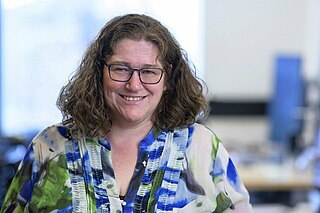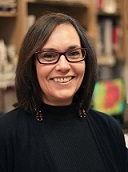Related Research Articles
The American Association for Cancer Research (AACR) is the world's oldest and largest professional association related to cancer research. Based in Philadelphia, the AACR focuses on all aspects of cancer research, including basic, clinical, and translational research into the etiology, prevention, diagnosis, and treatment of cancer. Founded in 1907 by 11 physicians and scientists, the organization now has more than 58,000 members in 142 countries and territories. The mission of the AACR is to prevent and cure cancer through research, education, communication, collaboration, science policy and advocacy, and funding for cancer research.

Joan Massagué, is a Spanish biologist and the current director of the Sloan Kettering Institute at Memorial Sloan Kettering Cancer Center. He is also an internationally recognized leader in the study of both cancer metastasis and growth factors that regulate cell behavior, as well as a professor at the Weill Cornell Graduate School of Medical Sciences.

Dana Pe'er, Chair and Professor in Computational and Systems Biology Program at Sloan Kettering Institute is a researcher in computational systems biology. A Howard Hughes Medical Institute (HHMI) Investigator since 2021, she was previously a professor at Columbia Department of Biological Sciences. Pe'er's research focuses on understanding the organization, function and evolution of molecular networks, particularly how genetic variations alter the regulatory network and how these genetic variations can cause cancer.
Zena Werb was a professor and the Vice Chair of Anatomy at the University of California, San Francisco. She was also the co-leader of the Cancer, Immunity, and Microenvironment Program at the Hellen Diller Family Comprehensive Cancer Center and a member of the Executive Committee of the Sabre-Sandler Asthma Basic Research Center at UCSF. Her research focused on features of the microenvironment surrounding cells, with particular interest in the extracellular matrix and the role of its protease enzymes in cell signaling.

Elizabeth M. Jaffee is an American oncologist specializing in pancreatic cancer and immunotherapy.
Dafna Bar-Sagi is a cell biologist and cancer researcher at New York University School of Medicine. She is the Saul J. Farber Professor in the department of biochemistry and molecular pharmacology and the department of medicine and senior vice president and vice dean for science at NYU Langone Health. Bar-Sagi has been a member of scientific advisory boards, including the National Cancer Institute, Starr Cancer Consortium, and Pancreatic Cancer Action Network.
Guillermina 'Gigi' Lozano is an American geneticist. She is a Professor and Hubert L. Olive Stringer Distinguished Chair in Oncology in Honor of Sue Gribble Stringer at the University of Texas MD Anderson Cancer Center, Houston, Texas. Lozano is recognised for her studies of the p53 tumour suppressor pathway, characterising the protein as a regulator of gene expression and that is disturbed in many cancers. She was the first to recognize that the p53 gene encoded a transcriptional activator of other genes Her lab has made significant contributions by developing and analyzing mouse models to study the activities of mutant p53, revealing how these mutations drive tumor development and progression. She also found out how the Mdm2 and Mdm4 proteins work in the body, especially in stopping cancer and controlling p53. This research suggested that blocking Mdm2/4 could be a new way to treat cancer.

Crystal L. Mackall is an American physician and immunologist. She is currently the Ernest and Amelia Gallo Family Professor of Pediatrics and Medicine at Stanford University. She is the founding director of the Stanford Center for Cancer Cell Therapy.
Pamela Sumiko Ohashi, PhD, FRSC is a Canadian medical researcher. She is co-director of the Campbell Family Institute for Breast Cancer Research, director of the Cancer Immune Therapy Program at the Princess Margaret Cancer Centre and a professor at the University of Toronto.

Uğur Şahin is a German oncologist and immunologist. He is the founder and CEO of BioNTech, which developed one of the major vaccines against COVID-19. His main fields of research are cancer research and immunology.
Roy S. Herbst is an American oncologist who is the Ensign Professor of Medicine, Professor of Pharmacology, Chief of Medical Oncology, and Associate Director for Translational Research at Yale Cancer Center and Yale School of Medicine in New Haven, Connecticut.
Karen E. Knudsen is Chief Executive Officer of American Cancer Society and its advocacy affiliate the American Cancer Society Cancer Action Network. She is the first woman to hold that position in either organization.
Franziska Michor is an Austrian computational biologist. She is a professor in the department of data science at the Dana–Farber Cancer Institute. She serves as Director of the Physical Sciences-Oncology Center and the Center for Cancer Evolution.

George Coukos is a physician-scientist in tumor immunology, professor and director of the Ludwig Cancer Research Lausanne Branch and director of the Department of oncology UNIL-CHUV of the University of Lausanne and the Lausanne University Hospital in Lausanne, Switzerland. He is known for his work on the mechanisms by which tumors suppress anti-cancer immune responses, and the role of the tumor vasculature in that suppression. In addition to his work in ovarian cancer, the combinatorial immune therapies proposed by Professor Coukos have been successfully tested and approved for lung, liver and kidney cancers.
Philip Greenberg is a professor of medicine, oncology, and immunology at the University of Washington and head of program in immunology at the Fred Hutchinson Cancer Research Center. His research is centered around T cell biology and therapeutic cell therapies. He is a co-founder of Juno Therapeutics.
Cornelis Joseph Maria Melief is a Dutch immunologuist specialising in cancer immunology and immunotherapy, with a focus on therapeutic cancer vaccines. He is emeritus Professor, former head of the Department of Immunohematology and Blood Transfusion at the Leiden University Medical Center, and Chief Scientific Officer at ISA Therapeutics in Netherlands. He is known for his work in the field of cancer immunology, devising new cancer therapies based on the activation of the patient's own immune system.

María S. (Marisol) Soengas is a Spanish immunologist who is a senior scientist at the Spanish National Cancer Research Center (CNIO). Her research considers melanoma and the development of new therapeutic strategies. She was elected to the European Molecular Biology Organization in 2022.
Karina Elizabeth de Visser, also named "Karin E. de Visser", is a researcher at the Netherlands Cancer Institute. Her research considers metastatic formation and how the immune system influences how people respond to cancer treatment.

Edna "Eti" Cukierman is a Mexican biochemist who is a professor at the Fox Chase Cancer Center. She serves as co-director of the Marvin & Concetta Greenberg Pancreatic Cancer Institute. Her research investigates pancreatic cancer and the tumor microenvironment.

Christina Curtis is an American scientist who is a Professor of Medicine, Genetics and Biomedical Data Science and an Endowed Scholar at Stanford University where her research investigates the evolution of tumors. She is director of Artificial Intelligence and Cancer Genomics at Stanford University School of Medicine and is on the board of directors of the American Association for Cancer Research.
References
- ↑ Coussens, Lisa Marie (1993). Regulation of junB expression by transforming growth factor-beta, adenovirus12-E1A, and by the retinoblastoma susceptibility gene product. OCLC 732921603.
- ↑ "Lisa M. Coussens M.D. (h.c.), Ph.D., FAACR | OHSU People | OHSU". www.ohsu.edu. Retrieved 2022-07-26.
- ↑ "Lisa Coussens". NFCR. Retrieved 2022-07-26.
- ↑ "Kineta Announces Formation of New Immuno-oncology Focused Scientific Advisory Board". www.prnewswire.com (Press release). Retrieved 2022-07-26.
- 1 2 "Breast Cancer Awards & Recognition". Susan G. Komen. Retrieved 2022-07-26.
- 1 2 Burns, Matthew. "American Association for Cancer Research Inaugurates New Leadership at the AACR Annual Business Meeting of Members 2022". American Association for Cancer Research (AACR). Retrieved 2022-07-26.
- ↑ "Q&A: Lisa Coussens on Her Leadership Year Ahead". Cancer Discovery. 12 (5): OF3. 2022-05-02. doi:10.1158/2159-8290.CD-ND2022-0003. ISSN 2159-8274. PMID 35344030. S2CID 247763495.
- ↑ McLaughlin, Erin. "AACR Gertrude B. Elion Cancer Research Award". American Association for Cancer Research (AACR). Retrieved 2022-07-26.
- ↑ Beveridge, Michael. "AACR-Women in Cancer Research Charlotte Friend Lectureship: Past Recipients". American Association for Cancer Research (AACR). Retrieved 2022-07-26.
- ↑ "Past Winners of the NCI Rosalind E. Franklin Award - NCI". dceg.cancer.gov. 2017-02-06. Retrieved 2022-07-26.
- ↑ "Lisa Coussens, Ph.D." National Foundation for Cancer Research. 2024-05-22. Retrieved 2024-08-08.
- ↑ Beveridge, Michael. "AACR Princess Takamatsu Memorial Lectureship: Past Recipients". American Association for Cancer Research (AACR). Retrieved 2022-07-26.
- 1 2 "Coussens Lab". Oregon Health & Science University. Retrieved 2024-08-08.
- ↑ "OHSU scientists Lisa Coussens, John Crabbe named 2018 AAAS fellows | OHSU Research News". OHSU Research News | Research News at OHSU. 2018-12-03. Retrieved 2022-07-26.
- ↑ "Society for Immunotherapy of Cancer (SITC) on LinkedIn: We are delighted to welcome Dr. Lisa M. Coussens from Oregon Health &…".
- ↑ "News - NAS".
- ↑ "Lisa M. Coussens, MD, PhD". MD Anderson Continuing Education.
- ↑ "Lisa M. Coussens – NAS". National Academy of Sciences. Retrieved 2024-08-08.